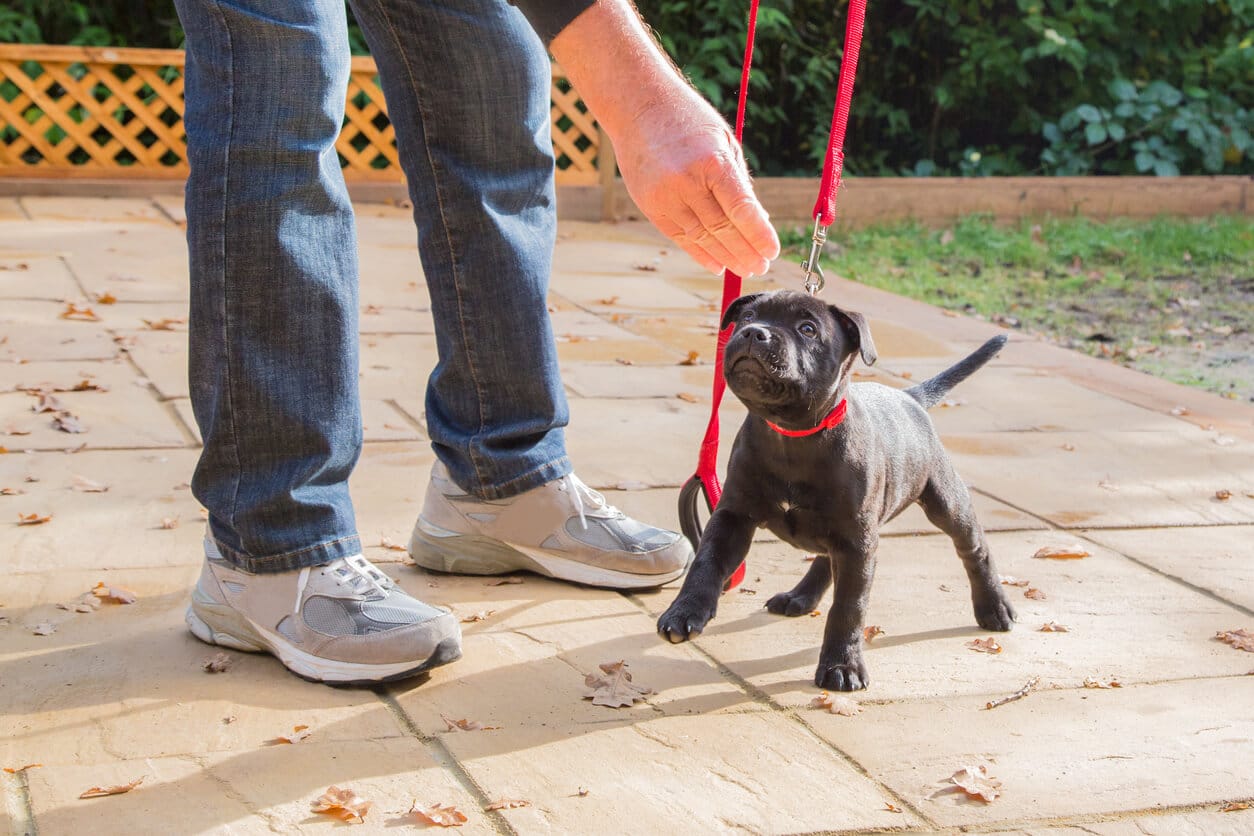- Not a substitute for professional veterinary help.
You’ve just brought home a new puppy, and now you can’t imagine going anywhere without them. Of course, not every destination is pet-friendly, so you’ll have to leave them behind on occasion—and puppy boarding is one option you might consider as you plan your vacation.
Experts say you can board puppies at least 4 to 6 months old. However, not all puppies will do well in a kennel or pet hotel, especially one meant for adult dogs. For some puppies, especially very young ones, a pet sitter or in-home dog boarding through Rover might be a better option.
Read on to learn more about boarding puppies, plus get expert tips on choosing the right option for your pup.
What’s the Minimum Age for Puppy Boarding?
A puppy should be at least 4 months old and have all their core puppy vaccinations before boarding, says Dr. Paige Adams, a veterinarian with Etowah Pet Hospital in Marietta, Georgia.
She adds, though, that it’s better to wait until your puppy is at least 6 months old. By that age, they’ll have gone through key developmental periods for training and socialization.
Boarding facilities should require that all dogs have these vaccinations before boarding. If they don’t, you’ll want to choose another facility to board your puppy. Most boarding facilities will also have a minimum age for boarding, though this can vary from place to place.
Will My Puppy Be OK If I Board Them?
Dr. Adams says well-socialized puppies will generally do all right with boarding, as socializing gets them used to new people, sights, smells, and places.
You can do a test run by leaving your puppy at a friend’s house for a few hours. If they stay calm during that experience, they’ll usually succeed at boarding, Dr. Adams explains.
She also recommends puppies receive basic crate training before boarding. Otherwise, the tight quarters of a kennel might feel too confining.
Extra Services and Amenities Worth Paying For
A kennel’s base boarding package isn’t always built with a puppy’s unique needs in mind. To help them adjust better to their stay, consider options with additional services, like:
- Training sessions: Doggie daycares or kennels may offer pet training services, allowing your puppy to keep up with obedience training during their stay.
- Extra playtime: Many kennels include an outdoor session in their usual boarding fee, but energetic pups might benefit from multiple outdoor sessions per day.
- Solo walks: Paying extra for individual walks can help your puppy burn more energy and get one-on-one time with a person.
Risks of Boarding Puppies
Boarding a young puppy in a kennel still does come with a few possible downsides. The biggest potential risks include:
- Lack of socialization: Puppies need to experience new sights, sounds, and people to grow up well-adjusted. Isolation-type boarding situations can lead to socialization setbacks, Dr. Adams explains. Your puppy’s “sensitivity window” typically peaks around the age of 14 weeks.
- Missed bonding time: The ideal time to bond with your puppy is during their socialization period, between 4 and 16 weeks. If your pup stays a long time in a boarding facility around this age, you could miss out on this crucial bonding time.
- Delayed training: Long boarding periods can stall a puppy’s progress with potty training and basic obedience, Dr. Adams says.
- Increased anxiety or fear: Most puppies go through a fear period of heightened anxiety between the age of 6 months to about a year and a half. While these periods are temporary, boarding a puppy during this time could make the experience more stressful.
- Risk of sickness: Just as you might catch an illness in a crowded environment, puppies spending time in close quarters at a kennel can pick up illnesses like kennel cough, influenza, or bordetella—especially if they don’t have all of their vaccinations.
Alternatives to Puppy Boarding Kennels
Worried about the risks of boarding or don’t know if your puppy can handle it? Boarding isn’t your only option!
You can give your puppy a more comfortable, low-stress environment while you’re away by hiring a pet sitter. Boarding with a sitter gives your puppy personalized attention they wouldn’t get at a pet boarding business that serves dozens of dogs a day.
Pet sitters may be able to maintain your puppy’s training routine, walks, and playtime. This can help give you a peace of mind about developmental setbacks. “The more attentive the caretaker can be, the better,” Adams says.
What’s more, while some sitters run doggie daycares out of their own homes, others can stay with your puppy at your home. Your puppy may feel even more comfortable if they don’t have to leave the space they’re most familiar with.
How to Find an In-Home Sitter
In-home pet sitters are a great option—as long as you can trust them, Dr. Adams says.
Signs of a trustworthy sitter include:
- No red flags in their record: If you’re letting someone into your home, you need to know they have your best interests at heart. Choosing a pet sitter willing to have a third-party background check can give you some peace of mind.
- Positive reviews: Only choose sitters who come with recommendations from friends and family or who have very good online reviews.
- Knowledge of puppy development: Your sitter should understand a puppy’s developmental needs and be prepared to continue their obedience and socialization training.
How to vet a sitter’s home
If you’ve found a good in-home sitter, check for the following green flags:
- Dog-friendly outdoor space: The sitter should ideally have a fenced-in backyard for outdoor playtime. Make sure they’ve covered any gaps or holes where a tiny pup could squeeze through!
- Clean and hygienic rooms: Your sitter’s house should be clean and puppy-proof. If you can’t walk the space before dropping your dog off, ask them to FaceTime you so you can check things out.
- Low number of dogs: Ask if your puppy will share the house with any other dogs during their stay. Another dog or two could be welcome playmates, but too many dogs could mean your puppy may not get as much individualized attention.
What to Pack for Your Puppy
Whether you choose to board your puppy at a traditional kennel or with a sitter, providing them with a few key items can help them feel safe and secure during their stay.
- Comfort items: Grab a blanket, bed, towel, or another cuddly item that smells like home. This helps your puppy stay calm and gives them a sense of security, Dr. Adams says.
- Toys: Bring one or two of your puppy’s favorite toys so they’ll have something familiar to play with. Just make sure it doesn’t have small buttons or frayed ropes that could pose a choking hazard during unsupervised play.
- Food and treats: If your dog has special dietary considerations, make sure they have enough of their usual food. Some favorite treats for positive reinforcement never hurt, either!
- Crate: If your puppy stay in the sitter’s home, bring their usual crate along. This way, they won’t need to stay in a crate that’s the wrong size or smells unfamiliar.
- Instruction list: Create a list with details of your puppy’s meal and exercise schedule, with notes of any special requests or considerations.
And, of course, don’t forget to show your puppy love with plenty of cuddles and kisses for the road—and just as many when you both come home!







